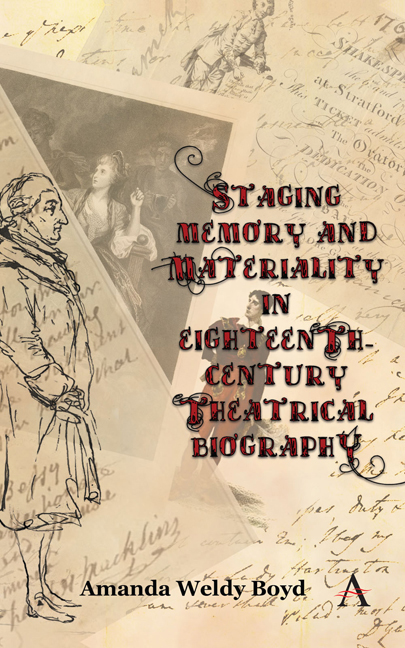Book contents
- Frontmatter
- Contents
- Acknowledgments
- Introduction: Competition and Legitimacy
- 1 “Davies's Name […] in Fame's Brightest Page Shall on Garrick Attend”: From Anonymous to Personalized Participation in the Memoirs of the Life of David Garrick
- 2 His Work, My Words: Anxiety and Competition in the Posthumous Lives of Charles Macklin, Comedian
- 3 Epistolary Resurrections: James Boaden and the Rise of the Professional Thespian Biographer
- Epilogue: The Limits of Materially Bound Permanence
- Notes
- References
- Index
2 - His Work, My Words: Anxiety and Competition in the Posthumous Lives of Charles Macklin, Comedian
Published online by Cambridge University Press: 10 May 2018
- Frontmatter
- Contents
- Acknowledgments
- Introduction: Competition and Legitimacy
- 1 “Davies's Name […] in Fame's Brightest Page Shall on Garrick Attend”: From Anonymous to Personalized Participation in the Memoirs of the Life of David Garrick
- 2 His Work, My Words: Anxiety and Competition in the Posthumous Lives of Charles Macklin, Comedian
- 3 Epistolary Resurrections: James Boaden and the Rise of the Professional Thespian Biographer
- Epilogue: The Limits of Materially Bound Permanence
- Notes
- References
- Index
Summary
Establishing Expectations: The Biographer as Artist
“This is the Jew that Shakespeare drew!” So runs the most famous bon mot about Charles Macklin, comedian (ca. 1699– 1797), supposedly spoken extemporaneously by Alexander Pope after witnessing Macklin assay the role of Shylock in the early 1740s. In 1968, J. O. Bartley introduced his edited version of Macklin's plays, Four Comedies by Charles Macklin, by suggesting that if any person could successfully make the transition from flesh to page, it would be Charles Macklin, due to the stodgy actor and playwright's strongly delineated characters, which he often wrote for himself, as versions of himself. This chapter seeks to evaluate the extent to which Macklin's early biographers were able to portray the man who drew the Jew that Shakespeare drew.
Certainly there was something special about Charles Macklin: upon his death in 1797, Macklin supplied the subject for three biographies in just six short years. Almost immediately, Francis Congreve's concise Authentic Memoirs of the Late Charles Macklin, Comedian (1798) appeared, followed by James Kirkman's strikingly inflated Memoirs of the Life of Charles Macklin (1799), and finally William Cooke's Memoirs of Charles Macklin, Comedian (1804). In contrast, the almost undisputed leading actor of the mid- eighteenth century and renowned pursuer of fame, David Garrick (1717– 1779), had only two fulllength biographies to his name in the same time period, spaced twenty years apart. This chapter attempts to address the intersections of temporality and preservation that fascinated and repelled theatrical biographers. I will particularly focus on the extent to which biographers could hope to overcome the barriers of time and space imposed in the shift from live performance to fixed text, and the effects of those anxieties still legible upon the biographies themselves.
It is easy to accept Macklin, an actor, as an artist; he brings a character to life from a playbook. The theatrical biographer performs a parallel but inverse operation, bringing a character to life from the stage onto the pages of biography. However, an assessment of current criticism involving biography as a genre shows a pervasive tendency toward discounting biography as having literary value in its own right. Biography, with few exceptions, is equated with source texts that enrich or explain literary works, more akin to an encyclopedia than a novel.
- Type
- Chapter
- Information
- Publisher: Anthem PressPrint publication year: 2017



